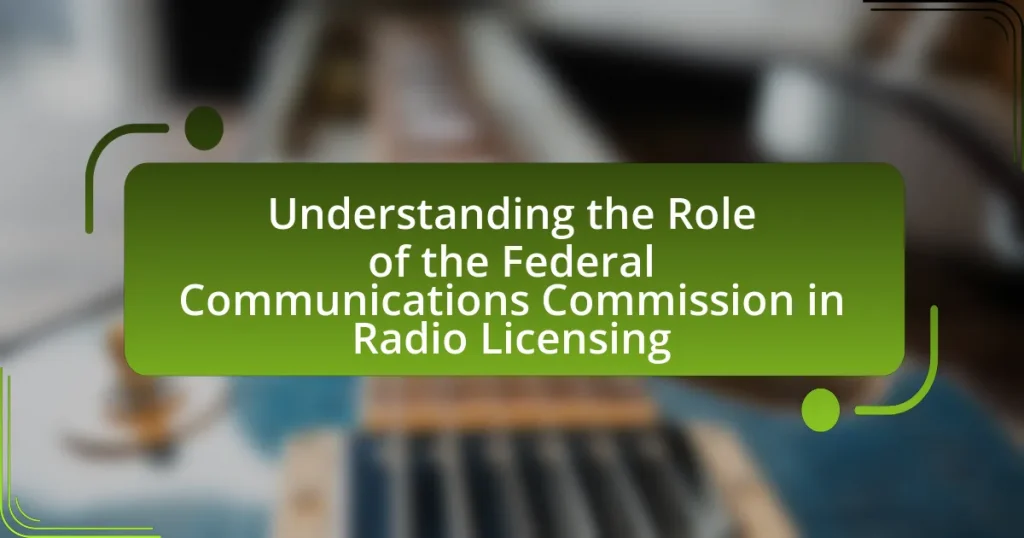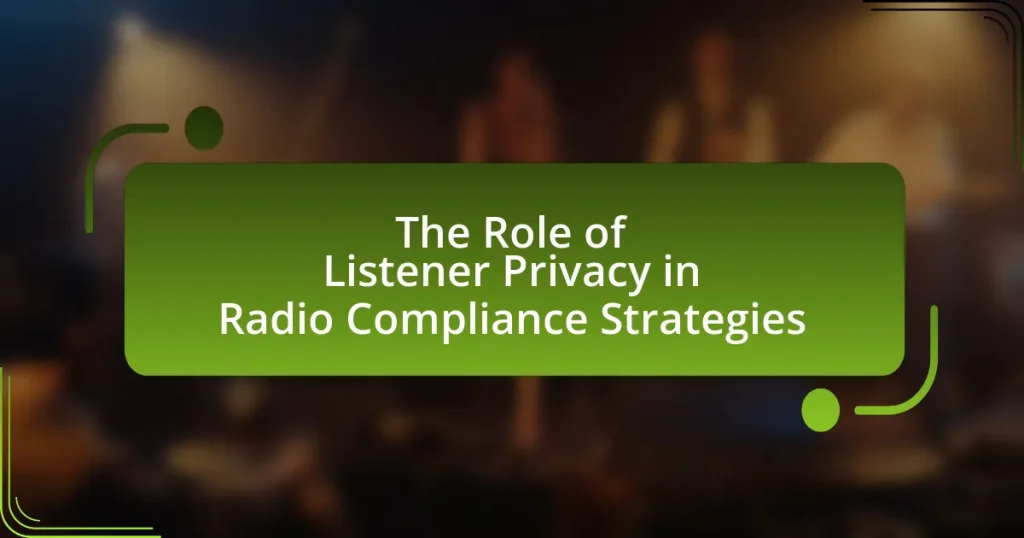Online radio stations encounter significant compliance challenges primarily related to copyright laws, licensing requirements, and regulatory obligations. These challenges necessitate securing proper licenses from performance rights organizations and adhering to Federal Communications Commission (FCC) regulations, which include content restrictions and advertising guidelines. Non-compliance can lead to severe penalties, including fines and legal action, jeopardizing the operational integrity of these stations. The article outlines the legal frameworks governing online radio compliance, the specific issues faced, and the best practices for ensuring adherence to regulations, while also discussing the evolving regulatory landscape and the impact of emerging technologies on compliance requirements.

What are the Compliance Challenges for Online Radio Stations?
Online radio stations face several compliance challenges, primarily related to copyright laws, licensing requirements, and regulatory obligations. These stations must secure proper licenses for the music they broadcast, which can involve navigating complex agreements with performance rights organizations like ASCAP, BMI, and SESAC. Additionally, online radio operators must comply with the Federal Communications Commission (FCC) regulations, which include content restrictions and advertising guidelines. Failure to adhere to these legal requirements can result in significant fines and legal repercussions, highlighting the importance of understanding and managing compliance effectively.
Why is compliance important for online radio stations?
Compliance is important for online radio stations because it ensures adherence to legal regulations and industry standards, which helps avoid penalties and legal issues. Online radio stations must comply with copyright laws, such as the Digital Millennium Copyright Act (DMCA), which mandates that they obtain licenses for the music they broadcast. Failure to comply can result in significant fines and the potential shutdown of the station. Additionally, compliance with Federal Communications Commission (FCC) regulations is necessary for maintaining broadcasting rights and ensuring content is appropriate for audiences. Thus, compliance safeguards the operational integrity and longevity of online radio stations.
What legal frameworks govern online radio compliance?
The legal frameworks governing online radio compliance primarily include copyright law, telecommunications regulations, and broadcasting standards. Copyright law, particularly the Digital Millennium Copyright Act (DMCA) in the United States, mandates that online radio stations obtain licenses for the music they stream, ensuring that artists and rights holders are compensated. Telecommunications regulations, enforced by agencies like the Federal Communications Commission (FCC), require compliance with licensing and operational standards for broadcasting. Additionally, the Federal Copyright Office oversees the licensing of digital audio transmissions, which further impacts online radio operations. These frameworks collectively ensure that online radio stations operate legally and ethically within the digital landscape.
How does non-compliance impact online radio stations?
Non-compliance significantly impacts online radio stations by exposing them to legal penalties, financial losses, and reputational damage. When online radio stations fail to adhere to copyright laws, licensing agreements, or regulatory requirements, they risk facing lawsuits from content owners, which can result in costly settlements or fines. For instance, the U.S. Copyright Office reported that non-compliance with licensing can lead to fines ranging from $750 to $30,000 per infringement. Additionally, non-compliance can lead to the suspension of broadcasting rights, further hindering the station’s ability to operate. This combination of legal repercussions and financial strain can severely undermine the viability and credibility of online radio stations in a competitive market.
What specific compliance issues do online radio stations face?
Online radio stations face specific compliance issues primarily related to copyright laws, licensing requirements, and content regulations. Copyright laws necessitate that online radio stations obtain licenses for the music they play, which can involve complex agreements with performance rights organizations like ASCAP, BMI, and SESAC. Additionally, stations must comply with the Digital Millennium Copyright Act (DMCA), which outlines the responsibilities of online platforms regarding copyrighted material. Failure to adhere to these regulations can result in legal penalties, including fines and shutdowns. Furthermore, online radio stations must also navigate regulations concerning advertising content, listener privacy, and data protection, which vary by jurisdiction and can complicate operational compliance.
How do copyright laws affect online radio broadcasting?
Copyright laws significantly impact online radio broadcasting by requiring stations to obtain licenses for the music and content they play. These laws ensure that artists and copyright holders are compensated for their work, which means online radio stations must navigate complex licensing agreements with organizations like ASCAP, BMI, and SESAC to legally stream music. Failure to comply with these copyright regulations can result in hefty fines and legal action against the broadcasting entity, as evidenced by numerous cases where unlicensed stations faced penalties for copyright infringement.
What are the licensing requirements for online radio stations?
Online radio stations must obtain a license to legally broadcast music and other content. In the United States, this typically involves securing a license from performance rights organizations (PROs) such as ASCAP, BMI, or SESAC, which manage the rights to public performances of music. Additionally, stations may need to acquire a sound recording license from SoundExchange for streaming recorded music. Compliance with these licensing requirements ensures that online radio stations can legally operate and avoid potential legal issues related to copyright infringement.
How do advertising regulations apply to online radio?
Advertising regulations for online radio require compliance with federal laws, such as the Federal Communications Commission (FCC) guidelines and the Federal Trade Commission (FTC) regulations. Online radio stations must ensure that advertisements are clearly identified and not misleading, adhering to truth-in-advertising standards. For instance, the FCC mandates that any sponsorship identification must be disclosed, meaning that listeners should be informed when content is sponsored or paid for by advertisers. Additionally, the FTC enforces rules against deceptive advertising practices, which apply to all forms of media, including online radio. These regulations are designed to protect consumers and maintain transparency in advertising practices.
What are the consequences of failing to comply with regulations?
Failing to comply with regulations can result in severe legal and financial consequences for online radio stations. Non-compliance may lead to hefty fines, which can range from thousands to millions of dollars depending on the severity of the violation and the specific regulations breached. For instance, the Federal Communications Commission (FCC) can impose fines for violations of broadcasting rules, and these penalties can escalate with repeated offenses. Additionally, non-compliance can result in the revocation of broadcasting licenses, which directly impacts the ability to operate legally. Furthermore, online radio stations may face lawsuits from copyright holders for unauthorized use of music or content, leading to costly legal battles and potential damages. These consequences highlight the critical importance of adhering to regulations in the broadcasting industry.
What penalties can online radio stations incur for non-compliance?
Online radio stations can incur penalties such as fines, license revocation, and legal action for non-compliance with copyright laws and broadcasting regulations. Specifically, failure to obtain the necessary licenses for music played can result in fines that may range from hundreds to thousands of dollars per infringement. Additionally, repeated violations can lead to the revocation of broadcasting licenses, effectively shutting down the station. Legal action from copyright holders can also result in costly settlements or judgments against the station. These penalties are enforced to ensure adherence to intellectual property rights and broadcasting standards.
How can non-compliance damage a station’s reputation?
Non-compliance can significantly damage a station’s reputation by leading to legal penalties, loss of audience trust, and negative media coverage. When a station fails to adhere to regulations, such as copyright laws or broadcasting standards, it risks facing fines or sanctions from regulatory bodies, which can publicly tarnish its image. For instance, a study by the Federal Communications Commission indicates that stations fined for non-compliance often experience a decline in listener engagement and trust, as audiences perceive them as unprofessional or unreliable. This erosion of trust can result in decreased advertising revenue and a long-term impact on the station’s viability in a competitive market.

How can Online Radio Stations Ensure Compliance?
Online radio stations can ensure compliance by adhering to copyright laws, obtaining necessary licenses, and following broadcasting regulations. Compliance requires securing licenses from performance rights organizations, such as ASCAP or BMI, which manage the rights of songwriters and publishers. Additionally, online radio stations must comply with the Digital Millennium Copyright Act (DMCA), which mandates proper handling of copyrighted material. Failure to comply can result in legal penalties, including fines or shutdowns, as evidenced by cases where non-compliant stations faced lawsuits from rights holders.
What best practices should online radio stations follow for compliance?
Online radio stations should adhere to licensing requirements, copyright laws, and data protection regulations to ensure compliance. Specifically, they must obtain the necessary licenses from performance rights organizations, such as ASCAP or BMI, to legally broadcast music. Additionally, online radio stations must comply with the Digital Millennium Copyright Act (DMCA) by implementing a notice-and-takedown system for copyright infringement. Furthermore, they should follow the General Data Protection Regulation (GDPR) guidelines if they collect personal data from listeners, ensuring transparency and consent in data handling practices. These practices are essential for avoiding legal penalties and maintaining operational integrity in the digital broadcasting landscape.
How can stations stay updated on changing regulations?
Stations can stay updated on changing regulations by subscribing to industry newsletters and regulatory agency alerts. These resources provide timely information on legal changes and compliance requirements specific to broadcasting. For example, the Federal Communications Commission (FCC) regularly issues updates that can be crucial for radio stations to remain compliant with federal laws. Additionally, participating in industry associations, such as the National Association of Broadcasters (NAB), offers access to workshops and seminars that discuss regulatory changes and best practices.
What role does legal counsel play in compliance for online radio?
Legal counsel plays a crucial role in ensuring compliance for online radio by providing guidance on regulatory requirements and legal obligations. This includes advising on copyright laws, licensing agreements, and content regulations that govern broadcasting. Legal counsel helps online radio stations navigate complex legal landscapes, ensuring adherence to the Federal Communications Commission (FCC) regulations and the Digital Millennium Copyright Act (DMCA). By doing so, they mitigate risks of legal disputes and potential fines, thereby safeguarding the station’s operations and reputation.
What tools and resources are available for compliance management?
Compliance management tools and resources include software solutions like ComplyAdvantage, LogicGate, and RSA Archer, which help organizations automate compliance processes and manage regulatory requirements. These tools provide features such as risk assessment, policy management, and reporting capabilities, enabling businesses to stay compliant with industry regulations. For instance, ComplyAdvantage offers real-time data on regulatory changes, while LogicGate allows for customizable workflows to address specific compliance needs. Additionally, resources such as the Compliance and Ethics Professional (CEP) magazine and the Society of Corporate Compliance and Ethics (SCCE) provide valuable insights and best practices for compliance management.
How can technology assist in ensuring compliance?
Technology assists in ensuring compliance by automating monitoring and reporting processes, which reduces human error and increases efficiency. For instance, compliance management software can track regulatory changes in real-time, ensuring that online radio stations adhere to licensing requirements and content regulations. According to a study by the International Compliance Association, organizations that implement technology solutions for compliance management experience a 30% reduction in compliance-related incidents. This demonstrates that leveraging technology not only streamlines compliance efforts but also enhances overall regulatory adherence.
What organizations provide support for online radio compliance?
Organizations that provide support for online radio compliance include the Federal Communications Commission (FCC), which regulates broadcasting standards in the United States, and the Recording Industry Association of America (RIAA), which offers guidance on music licensing and copyright issues. Additionally, the Digital Media Association (DiMA) advocates for the interests of digital media companies, including online radio, and provides resources for compliance with copyright laws. These organizations play crucial roles in ensuring that online radio stations adhere to legal requirements and industry standards.

What are the Future Trends in Compliance for Online Radio Stations?
Future trends in compliance for online radio stations include increased regulatory scrutiny, the adoption of advanced technology for monitoring content, and a greater emphasis on data privacy. Regulatory bodies are likely to implement stricter guidelines to ensure adherence to copyright laws and content standards, as evidenced by recent legislative changes in various countries aimed at protecting intellectual property rights. Additionally, online radio stations are expected to leverage artificial intelligence and machine learning tools to automate compliance processes, thereby enhancing their ability to monitor broadcasts for adherence to regulations. Furthermore, as data privacy concerns grow, online radio stations will need to comply with regulations such as the General Data Protection Regulation (GDPR) in Europe, which mandates stringent data handling practices. These trends indicate a shift towards a more structured and technology-driven compliance landscape for online radio stations.
How is the regulatory landscape evolving for online radio?
The regulatory landscape for online radio is evolving towards increased scrutiny and compliance requirements. Recent developments include the implementation of stricter copyright laws and licensing agreements, which aim to ensure that online radio stations pay appropriate royalties to artists and content creators. For instance, the Music Modernization Act in the United States has introduced new frameworks for licensing digital music, impacting how online radio stations operate. Additionally, regulatory bodies are increasingly focusing on data privacy and consumer protection, requiring online radio platforms to adhere to regulations like the General Data Protection Regulation (GDPR) in Europe. These changes reflect a broader trend of aligning online radio operations with traditional broadcasting standards, ensuring fair compensation and consumer rights in the digital audio landscape.
What emerging technologies may impact compliance requirements?
Emerging technologies that may impact compliance requirements include artificial intelligence, blockchain, and data analytics. Artificial intelligence can automate compliance monitoring and reporting, potentially leading to more efficient regulatory adherence. Blockchain technology offers secure and transparent transaction records, which can enhance accountability and traceability in compliance processes. Data analytics enables organizations to analyze large volumes of data for compliance risks, allowing for proactive measures to be taken. These technologies are reshaping how compliance is managed, necessitating updates to existing regulations to address their implications effectively.
How can online radio stations prepare for future compliance challenges?
Online radio stations can prepare for future compliance challenges by implementing robust legal frameworks and staying informed about evolving regulations. This involves regularly consulting with legal experts specializing in broadcasting laws and intellectual property rights to ensure adherence to licensing requirements and copyright laws. Additionally, online radio stations should invest in compliance management systems that monitor changes in legislation and automate reporting processes. For instance, the Federal Communications Commission (FCC) in the United States frequently updates its regulations, and being proactive in understanding these changes can prevent potential legal issues. By establishing a culture of compliance and training staff on regulatory requirements, online radio stations can effectively mitigate risks associated with non-compliance.
What practical steps can online radio stations take to enhance compliance?
Online radio stations can enhance compliance by implementing robust licensing agreements and regularly updating their music libraries to reflect current copyright laws. Establishing clear protocols for tracking and reporting music usage ensures adherence to licensing requirements, which is crucial given that the U.S. Copyright Office reported over $1 billion in royalties collected for music licensing in 2020. Additionally, investing in compliance management software can streamline the monitoring of content and automate reporting processes, reducing the risk of unintentional violations. Regular training for staff on copyright laws and compliance practices further reinforces a culture of adherence within the organization.
How can regular audits improve compliance efforts?
Regular audits enhance compliance efforts by systematically identifying gaps and weaknesses in adherence to regulations. These audits provide a structured approach to evaluate processes, ensuring that online radio stations meet legal and industry standards. For instance, a study by the Compliance, Governance and Oversight Council found that organizations conducting regular audits improved compliance rates by up to 30% due to early detection of non-compliance issues. This proactive monitoring not only mitigates risks but also fosters a culture of accountability and continuous improvement within the organization.
What training should staff receive regarding compliance issues?
Staff should receive training on legal regulations, ethical standards, and internal policies related to compliance issues. This training should cover specific laws such as the Digital Millennium Copyright Act (DMCA) and Federal Communications Commission (FCC) regulations that govern online broadcasting. Additionally, staff should be educated on data protection laws like the General Data Protection Regulation (GDPR) to ensure compliance with privacy standards. Regular updates and refresher courses should be implemented to keep staff informed about changes in legislation and best practices in compliance.



